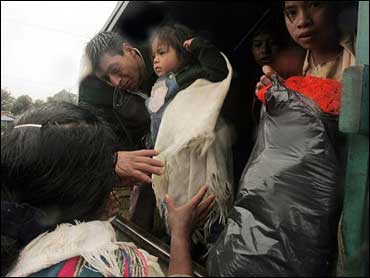60 Minute Timer Feed in Road Rescue Ambulance

Guatemala Death Toll Rises
Rescue workers in Guatemala said they pulled at least 40 bodies from a massive mudslide and found 20 more dead in a swollen river Thursday, raising to at least 231 the number of people killed from five days of pounding rains in Central America and Mexico.
Officials expected the death to toll to climb as they searched for more than 150 others who were missing following the landslide in Solola, a town close to Lake Atitlan, 60 miles west of the capital, Guatemala City.
Along the country's Pacific coast, the Nahualate River broke from its banks, creating a new outlet to the sea and killing at least 20 people from a small, seaside village, navy officials said.
Claudio Manchinel, from Iztapa in coastal, southern Guatemala, was forced to walk for hours through rain and mud with his pregnant wife, Leticia. Upon reaching a highway, the couple stopped an ambulance, which took them to a naval base, where their son Claudio was born Wednesday.
Manchinel said the flooding reminded him of Hurricane Mitch, which killed at least 9,000 people throughout Central America in 1998.
"We thought it was going to be like Mitch in 1998," he said Thursday. "But now it's worse."
The recovery of the bodies pushed the number killed in the region to 231, including 14 victims earlier this week in Nicaragua, Honduras and Costa Rica, and 13 victims who died in three southern Mexican states.
The current death toll in Guatemala is 139, with the majority of the victims killed in landslides.
For the first time in five days, rains let up Thursday, allowing Guatemalan President Oscar Berger to fly over devastated areas and evaluate damage.
He asked Congress to declare a state of emergency as rescue workers in Solola reported that two other villages had been buried by landslides, including Las Giraldas, 55 miles west of Guatemala City. There, more than a dozen people were working to dig out houses buried when a second hillside collapsed.
In Quetzaltenango, Guatemala's second largest city 125 miles west of the capital, flood waters rose up 6.5 feet high, destroying hundreds of homes, businesses and public buildings, firefighters said.
More than 24,000 people from 270 communities took refuge in shelters throughout Guatemala, but were suffering from cold and a lack of food and water, according to Guatemalan radio reports. Quetzaltenango residents reported a similarly critical situation.
"It was complicated arriving with new shipments of food" because of the bad weather, said Agriculture Minister Alvaro Aguilar. "Today, we are making an effort" to reach the areas by air.
Guatemalan rescue workers also were trying to restore access to 300 roadways blocked by fallen trees, flooding and landslides.
In El Salvador, where the heavy rains have left 65 dead, rescuers also stepped up aid flights and flyovers as the sun emerged from behind the clouds.
Authorities also were on alert for new landslides and flooded rivers similar to those that already had closed or destroyed dozens of highways and bridges. Officials said nearly 54,000 people had been evacuated to 370 shelters throughout the country, while nearly 80 percent of the country's roadways had been affected by the rains.
"The rain stopped, rays of sun have begun to warm the country, but the danger continues," said Salvadoran Red Cross spokesman Carlos Lopez Mendoza. "The ground is saturated and we could have more tragedies."
Among the Salvadorans evacuated were residents of Santa Tecla, outside the capital, San Salvador, where a strong earthquake caused a massive landslide in January 2001.
The Mexican Air Force on Thursday was preparing to deliver 220 tons of food and 33 tons of emergency supplies to El Salvador. Mexican President Vicente Fox said his country acted in response to a personal plea from Salvadoran President Tony Saca.
Fox also said two planes loaded with 40 US tons of aid would fly out Thursday to southern areas of Mexico devastated by the rains.
The United States also offered humanitarian aid to Mexico and Central America, dolling out donations shortly after Mexican troops returned from several weeks of helping U.S. officials clean up after Hurricane Katrina.
"To be united, to be friendly, pays and pays well," Fox said.
On Wednesday, Fox visited the city of Tapachula in the southern state of Chiapas, where flood waters destroyed 50 bridges, swept away homes, engulfed highways, and cut off electricity and telephone service. Officials reported eight deaths throughout the state and 25,000 people were living in 103 shelters. Residents in the area sent repeated pleas for aid via news reporters.
The rain and clouds "have not allowed us to go in with airplanes and helicopters and as a result have limited our capacity to act," Fox said Thursday. Likewise, he said rough seas had prevented two large ships of aid from reaching affected areas.
Late Thursday, he toured Veracruz state, hit by Hurricane Stan earlier this week. Schools remained closed and many residents were still living in shelters as rain continued to pound the region.
Three people were reported to have drowned across the state, including one person who was drunk and fell into a flooded street. In neighboring Oaxaca state, a couple died in a landslide.
Thanks for reading CBS NEWS.
Create your free account or log in
for more features.
Source: https://www.cbsnews.com/news/guatemala-death-toll-rises-04-10-2005/
Post a Comment for "60 Minute Timer Feed in Road Rescue Ambulance"